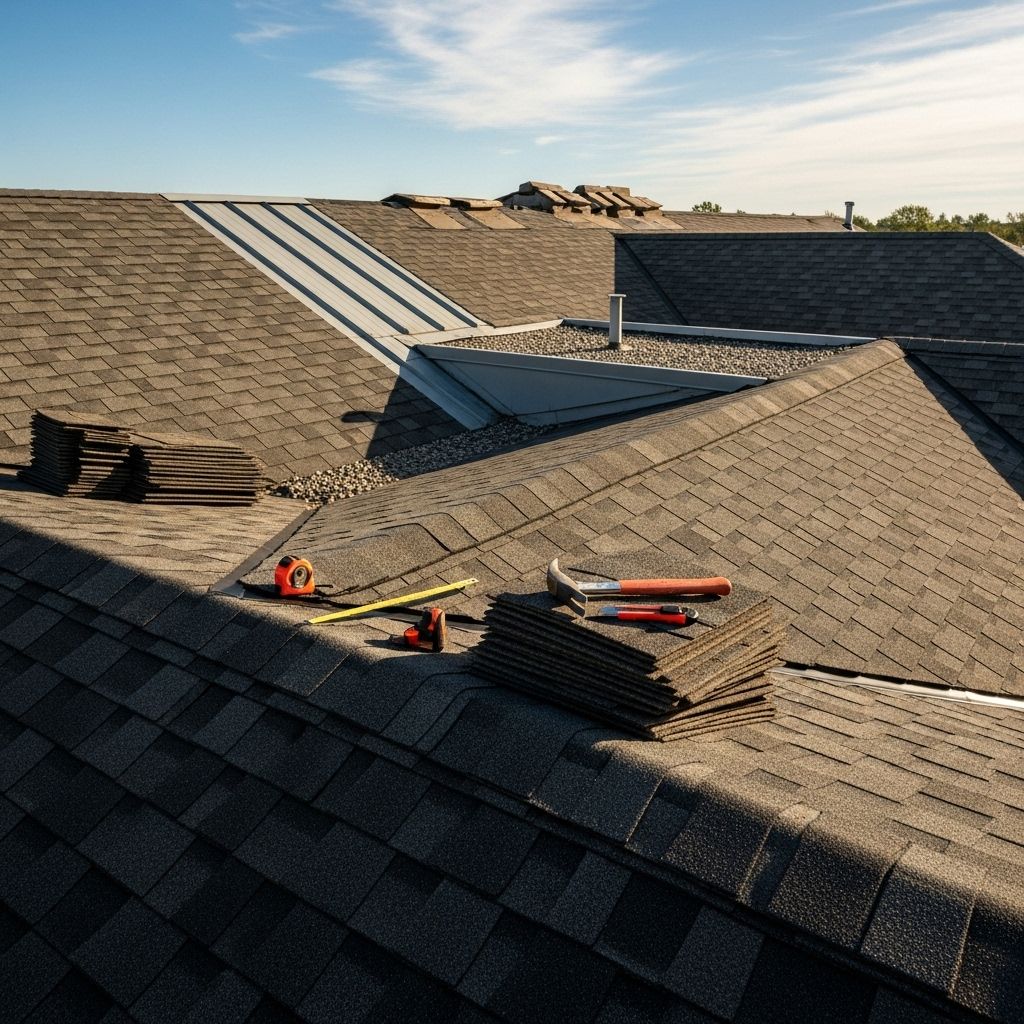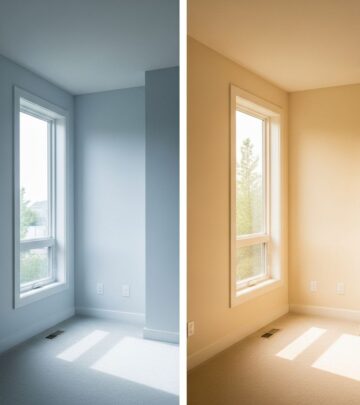Roof Replacement Cost In 2025: 4 Essential Factors To Budget
Discover budgeting tips, hidden expenses, and expert advice for your upcoming home upgrade.

Image: HearthJunction Design Team
New Roof Cost Guide (2025): What You Need to Know
A new roof represents one of the most significant home improvement investments you’ll make as a homeowner, with costs typically ranging from $8,900 to $29,500 depending on various factors. Whether you’re replacing an aging roof or installing one on a new construction, understanding the costs involved helps you budget appropriately and make informed decisions about materials and contractors.
This comprehensive guide breaks down everything you need to know about new roof costs in 2025, helping you navigate the complexities of roof replacement with confidence.
Average Cost of a New Roof in 2025
The national average cost for a new roof installation falls between $8,900 and $29,500, with most homeowners spending around $11,000 for a complete replacement. This wide range reflects the numerous variables that influence pricing, from roofing materials to home size and regional labor costs.
For most residential properties, you can expect to pay between $4.50 and $12.25 per square foot for a new roof installation, including materials and labor. Premium materials like slate, copper, or clay tiles can push costs significantly higher, potentially exceeding $50,000 for larger homes.
Cost Factors for Roof Replacement
Several key factors determine the final price tag of your new roof:
Roof Size and Dimensions
The square footage of your roof is the primary cost driver for any replacement project. A larger roof requires more materials and labor, directly increasing your total investment. Most roofing contractors price their work by the “square” (100 square feet) or by the total square footage.
| Roof Size (Square Feet) | Estimated Price Range |
|---|---|
| 1,000 | $4,500 – $11,000 |
| 1,500 | $7,000 – $15,000 |
| 2,000 | $9,000 – $22,000 |
| 2,500 | $11,000 – $27,000 |
| 3,000 | $14,000 – $33,000 |
Roofing Materials
Material choice significantly impacts your overall roof replacement cost. Asphalt shingles remain the most affordable and popular option, while metal, tile, and slate offer greater durability and aesthetic appeal at higher price points.
Here’s a breakdown of common roofing materials and their approximate costs per square foot:
- Asphalt Shingles: $4.50 – $7.00 per sq ft (including installation)
- Metal Roofing: $6.00 – $14.00 per sq ft
- Wood Shakes/Shingles: $6.50 – $14.00 per sq ft
- Clay or Concrete Tiles: $10.00 – $18.00 per sq ft
- Slate Roofing: $15.00 – $30.00 per sq ft
- Synthetic Roofing: $7.00 – $12.00 per sq ft
Roof Pitch and Complexity
The steepness (pitch) and architectural complexity of your roof directly impact labor costs. Steeper roofs require additional safety equipment, slow down the installation process, and may require more experienced installers. Similarly, roofs with multiple levels, dormers, skylights, or unusual shapes require more detailed work and material cutting, increasing labor hours and waste material.
Geographic Location
Your location affects roofing costs through regional variations in:
- Local labor rates
- Building code requirements
- Material availability and shipping costs
- Climate considerations that may necessitate specific underlayment or ventilation solutions
Urban areas and regions with higher costs of living typically see price premiums for roofing services compared to rural locations.
Labor vs. Material Costs
When budgeting for a new roof, understanding the breakdown between labor and materials helps you evaluate quotes and identify potential savings. Typically, labor accounts for approximately 60% of the total project cost, while materials make up the remaining 40%.
For example, on an 1,800-square-foot asphalt shingle roof replacement costing $8,500:
- Labor: Approximately $5,100
- Materials: Approximately $3,400
This ratio can shift depending on material choices, with premium materials comprising a larger percentage of the total cost.
Additional Cost Factors to Consider
Roof Removal and Disposal
Before installing new roofing materials, contractors must remove and dispose of the existing roof. This process typically costs between $1.00 and $5.00 per square foot depending on:
- Number of existing layers to remove
- Type of materials being removed
- Local disposal fees and regulations
- Accessibility of the roof for debris removal
Structural Repairs
During roof replacement, contractors may discover underlying structural issues that require repair before the new roof installation. Common problems include:
- Rotted or damaged roof decking/sheathing
- Water damage to roof trusses or rafters
- Sagging roof sections requiring reinforcement
Typically, contractors charge $40 to $80 per sheet for plywood replacement, with additional charges for more extensive structural repairs. Budget for a contingency of 10-15% of your total roofing cost to cover potential repairs.
Ventilation and Insulation Updates
Proper roof ventilation extends the life of your roofing materials and improves energy efficiency. During replacement, many homeowners opt to upgrade ventilation systems with:
- Ridge vents ($2-$3 per linear foot)
- Soffit vents ($20-$30 per vent)
- Power attic ventilators ($200-$500 each)
Similarly, improving attic insulation during roof replacement can enhance energy efficiency and comfort.
Flashing, Gutters, and Accessories
Complete roof systems include more than just the visible roofing materials. Additional components include:
- Flashing for chimneys, valleys, and wall intersections
- Drip edge and ice barrier membranes
- Gutter replacement or repair
- Roof vents and pipe boots
These accessories typically add $1,000-$2,000 to a complete roof replacement, depending on the size and complexity of your roof.
How To Quickly Calculate the Estimated Cost of Your New Roof
While professional estimates provide the most accurate pricing, you can quickly calculate a rough estimate using these steps:
- Determine your home’s square footage from property records or by measuring the building footprint.
- Find the estimated roof square footage by multiplying your home’s square footage by the pitch multiplier (typically 1.12 for average residential roofs).
- Multiply by the average cost per square foot for your chosen roofing material to get a baseline material cost.
- Add 60% to account for labor costs if calculating only from material pricing.
For example, a 2,000 square foot home with a typical pitch using asphalt shingles:
- Roof square footage: 2,000 × 1.12 = 2,240 sq ft
- Material cost: 2,240 × $5.00 = $11,200
- Total estimated cost including labor: $11,200 × 1.60 = $17,920
When to Replace Your Roof
Knowing when to invest in a new roof helps you plan financially and avoid emergency replacements. Common signs it’s time for a new roof include:
- Age of roof (most asphalt shingle roofs last 20-25 years)
- Missing, cracked, or curling shingles
- Significant granule loss from asphalt shingles
- Visible sagging or dips in the roofline
- Water stains or leaks in your attic or ceilings
- Daylight visible through the roof boards
Financing Options for Roof Replacement
Given the significant investment a new roof represents, many homeowners explore financing options, including:
- Home equity loans or lines of credit – Often offer favorable interest rates since they’re secured by your property
- Roofing company financing – Many contractors partner with financial institutions to offer payment plans
- Personal loans – Unsecured loans based on your credit history
- Credit cards – Best for smaller projects or when promotional 0% interest periods are available
- Government programs – Some localities offer grants or low-interest loans for home improvements
Always compare interest rates, terms, and total costs before selecting a financing option.
Choosing a Roofing Contractor
Selecting the right roofing contractor significantly impacts both the cost and quality of your new roof. When evaluating potential contractors:
- Verify proper licensing and insurance coverage
- Check references and review previous work
- Obtain at least three detailed written estimates
- Confirm warranty coverage for both materials and workmanship
- Review the complete contract before signing
Avoid contractors who request full payment upfront, pressure you for an immediate decision, or offer significantly lower prices than competitors.
Frequently Asked Questions (FAQs)
Q: How long does a typical roof replacement take?
A: Most residential roof replacements take 1-3 days to complete, depending on the size and complexity of the roof, weather conditions, and the number of workers on the crew. Larger homes or those with complex roof designs may take up to a week.
Q: Can I install a new roof over my existing shingles?
A: While it’s sometimes possible to install a second layer of asphalt shingles over an existing layer, complete removal is generally recommended. Multiple layers add weight, prevent inspection of the roof deck, and may void manufacturer warranties. Many building codes also limit the number of roofing layers permitted.
Q: What time of year is best for roof replacement?
A: Late spring through early fall typically offers the most favorable weather conditions for roof installation. However, many roofing contractors work year-round in most climates, adjusting their techniques for temperature and precipitation. Scheduling during the off-season (late fall or winter) may result in cost savings and quicker scheduling.
Q: Will my homeowners insurance cover roof replacement?
A: Insurance typically covers roof replacement only when damage results from sudden, accidental events like storms, fallen trees, or fires. Normal aging and wear are considered maintenance issues and generally aren’t covered. Review your policy details and document any storm damage with photos to support potential claims.
Q: How can I extend the life of my new roof?
A: Regular maintenance significantly extends roof lifespan. Schedule annual inspections, keep gutters clean, remove debris, trim overhanging branches, address moss or algae growth promptly, and repair minor issues before they escalate into major problems.
Conclusion
A new roof represents a significant investment in your home’s protection, value, and appearance. By understanding the costs involved and the factors that influence pricing, you can make informed decisions about materials, timing, and contractor selection.
Whether you’re planning for a future replacement or facing an immediate roofing emergency, this guide provides the foundation for budgeting appropriately and navigating the roof replacement process with confidence.
References
- https://www.thisoldhouse.com/roofing/reviews/new-roof-cost
- https://www.thisoldhouse.com/roofing/reviews/shingle-roof-cost
- https://www.thisoldhouse.com/roofing/21019048/read-this-before-you-redo-your-roof
- https://www.thisoldhouse.com/roofing/reviews/cost-to-raise-roof
- https://www.nerdwallet.com/article/mortgages/roof-replacement-cost
Read full bio of medha deb










